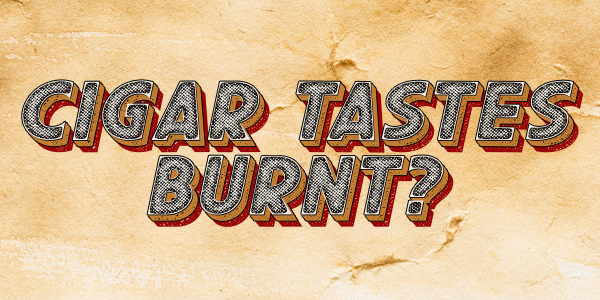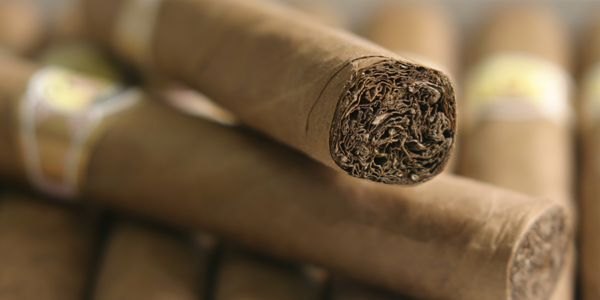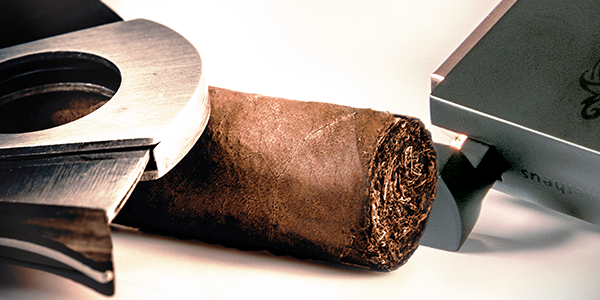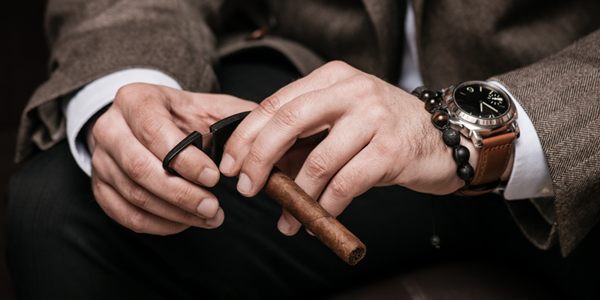Cigar Tastes Burnt
No one enjoys a cigar that tastes burnt or bitter. When you’ve been waiting all day to finally sit down and smoke one of your favorite cigars, the last thing you want is a burnt-tasting smoke. Below, we explain what can cause a cigar to taste bad and how to avoid it.
Store Your Cigars in a Humidor
Letting your cigars dry out is one of the most common cigar problems. If you bought a handful of cigars a few weeks ago from your local smokeshop and the first ones you smoked tasted great, but now you’re lighting up the last ones from the same batch and they’re bitter, what’s wrong? They’ve lost their humidity. Because many of us smoke cigars occasionally, you’re not alone if you haven’t invested in a humidor. Without proper storage, though, premium cigars gradually dry out and will taste noticeably different, especially when they’re out of the humidor for a week or more.
Premium handmade cigars need to be kept at roughly 70% RH (relative humidity) and 70 degrees Fahrenheit. Luckily, there are plenty of ways to keep your cigars fresh without a humidor. Your cigars will stay fresh for months in a Ziploc bag with a Boveda Pack inside or store them in a Boveda Humidor Bag. If your cigars are dried out, re-humidify them before you smoke them.
Light Your Cigar Evenly
The wrapper on a premium cigar accounts for the lion’s share of its taste, but the binder and filler tobaccos at the center of a cigar must combust evenly with the wrapper to deliver a consistent flavor. If your cigar is burning crooked, or canoeing, it can taste bad because you’re tasting an unbalanced and disproportionate amount of binder, filler, or wrapper tobacco. How you light your cigar is important, and the goal is to get an even burn.
Use Clean Lighter Butane
Believe it or not, lighter fuel makes a difference. For example, never light a cigar with a lighter that uses liquid Zippo fuel. Liquid fuel is less refined – like the lighter fuel you use to ignite the charcoals in your grill – and it will interfere with the taste of your cigar. Choose a clean-burning butane for your lighter, or use long cedar matches or even a cedar spill to light your cigar with the least interference.
Don’t Smoke Too Fast
Slow down. Taking too many puffs of your cigar too quickly can cause it to burn hot and taste bitter and burnt. Set your cigar down and wait for 30 seconds or a minute in between puffs. How long you take to smoke a cigar can dramatically affect its taste, and you’ll pick up far more nuances by giving each puff plenty of time to resonate on your palate.
Let the Ash Develop
Gently tap your cigar’s ash off, but allow it to grow for an inch or two beforehand. The ash serves a purpose because it insulates the foot of your cigar from receiving too much oxygen, which can cause a cigar to taste hot and burnt.
Smoke Cigars You Like
Everyone’s palate is different, and what tastes good to someone else may not taste the same to you. If you’re smoking a new cigar that someone recommended and you don’t like it, there may not be anything amiss other than that it’s a cigar you don’t care for.
The Chemistry in Your Mouth
What you’ve had to eat before you smoke, and what you’re drinking while you smoke, can change your experience of a cigar. That’s why two of the same cigars can taste different. It’s always wise to sip on water and keep your palate hydrated when you’re smoking. Pair your cigar with a spirit or beverage you enjoy, whether it’s bourbon, scotch, beer, or coffee.
You’ve Got Bad Cigars
Not all cigars are created equal. The best cigar-makers insist on aging their harvests until their tobaccos are perfectly fermented, which can take years. In other cases, cigar-makers might rush their production to keep up with demand by relying on tobacco that’s too young. If tobacco is not fermented long enough, you can taste impurities like minerals and ammonia in the finished cigar, and you’re left with an unpleasant, bitter smoke.






